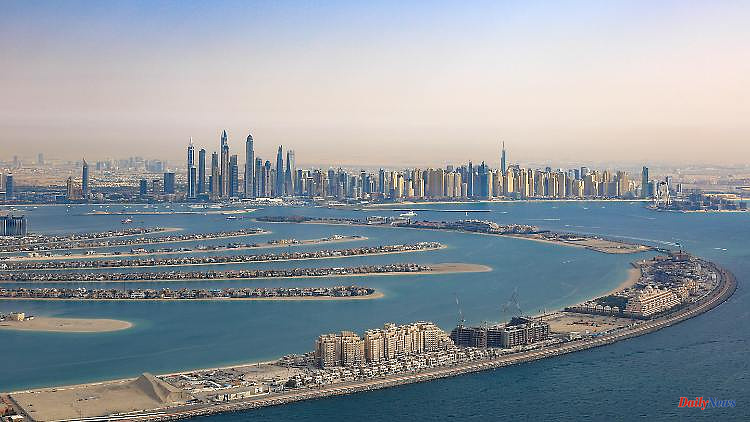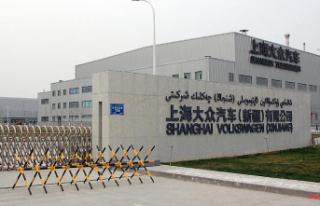The Emirates don't want to hear about sanctions against Russia. Above all, the luxury metropolis of Dubai is a safe haven for oligarchs and other rich Russians. The West doesn't do much to counter that. Roman Abramovich's private jet could change that.
Those who reside on the island of Palm Jumeirah, which has been raised in the Persian Gulf, are among their own kind. The skyline of Dubai, which shoots up out of the desert sand behind it, shows not very subtly: Big money is at home here. Or to put it another way: if you bring enough money with you, you can be at home here. For wealthy Russians, this is a welcome proposition. Because while large parts of the world are freezing and confiscating Russian assets, the United Arab Emirates have so far not participated in any sanctions as a result of the Russian attack on Ukraine. And so, in particular, the financial center of Dubai is becoming a haven for oligarchs and other well-heeled Russians.
Of the more than 5,000 Russian citizens owning property in Dubai, around 100 are members of the political elite. This is shown by land register entries from 2020 that were passed to the research organization Center for Advanced Defense Studies. Many of them belong to President Vladimir Putin's circle. One is the Duma deputy and former head of government of the self-proclaimed Donetsk People's Republic, Alexander Borodai. He owns an apartment on Palm Jumeirah and is sanctioned by several western states.
Borodai is thus in the immediate vicinity of Ruslan Baisarov, a confidant of Chechen ruler Ramzan Kadyrov. He owns five apartments and a beach villa on the artificial island. In the city's most expensive residential area, an apartment can cost several million euros - and the prices are rising. Other super-rich people like billionaires Dmitri Rybolowlew and Andrey Molchanov also have luxury villas in Dubai.
With the beginning of the war, demand from Russia for real estate in the desert emirate exploded, reports the "Guardian". "A drastic number of Russian investors are buying units," Alan Pinto tells the paper. The consultant of a brokerage firm from Dubai also reports a large number of rental inquiries. According to him, the landlord usually receives the money from an intermediary. Payment is made in cryptocurrencies.
The United Arab Emirates are known for their discretion in the financial affairs of the super-rich - critics call it a lack of transparency. If you bring the necessary small change with you, you will not only save yourself uncomfortable questions, but will even be welcomed with open arms. The country distributes so-called "Golden Visas" to wealthy foreigners. According to Business Insider, this also applies to sanctioned oligarchs. In exchange for an investment of $2.7 million in a local business or fund, there is a long-term residency permit—all unbureaucratic.
However, the confederation of states on the Arabian Peninsula is transparent in its position on the war in Ukraine. In the UN Security Council, the Emirates did not condemn the attack, but abstained. They also reject international sanctions. A prominent beneficiary of this policy is Roman Abramovich. The US judiciary wants to confiscate his private jet, a Boeing 787-8 Dreamliner. But he has been parked in Dubai since the beginning of March and is thus beyond Washington's sphere of influence. The Emirates are also a safe haven in the truest sense of the word for yachts sanctioned by oligarchs: billionaire Andrei Melnitschenko saved his luxury ship in the waters off the city of Ras al-Khaimah.
Because of government restraint, the Emirates have long been considered a money laundering paradise. In view of the Russian war of aggression, this has reached a new dimension. Russian banks are not sanctioned there, the flow of money is possible without further ado. The security expert Jodi Vittori sees a veritable exodus to Dubai of Russians who want to protect their assets in the event of national bankruptcy. "That will be a major challenge when sanctions are imposed on Russia and Russians abroad: finding out who earned their money honestly - and who through advantage and corruption," says the professor at Georgetown University of the "taz". "As long as places like this [like Dubai] exist, sanctions aren't really going to work."
The West knows that too, but has so far accepted the opaque money flows in the desert state. After all, the Emirates function firstly as a close security policy partner of the USA and secondly as a reliable supplier of gas and oil to Europe. At the beginning of March, the international anti-money laundering organization Financial Action Task Force put the United Arab Emirates on its "grey list". They are therefore under increased surveillance. But little has happened: the more far-reaching the sanctions against Russia, the more the desert state obviously benefits.
In the meantime, the first calls are being made to boycott the Emirates. "Dubai has long been a safe place for dirty money. It should now be blacklisted from the financial world and its leaders shouldn't be welcome here," the Guardian quoted financial expert and longtime Putin critic Bill Browder as saying. If the Gulf state doesn't help track oligarchs' fortunes, the West must impose "secondary sanctions."
The United Arab Emirates stress that they are not obliged to implement other countries' sanctions. At the same time, since February 24th, i.e. the day of the Russian invasion, there has been a legal assistance and extradition agreement with the USA and other countries. How the West's relationship with the Emirates develops could be decided by the fate of ex-Chelsea boss Abramovich's Boeing. Former FBI agent Karen Greenaway told the Guardian that the United States is likely to ask for government help to implement its sanctions. This could become the acid test of the relationship between the two countries.












